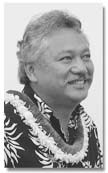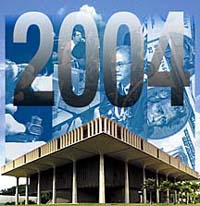
Lawmakers prepare
to tackle ‘ice’ problemThe second session opens today
focusing also on education
State lawmakers open the second session of the 22nd Legislature this morning, focusing on education and Hawaii's crystal methamphetamine or "ice" epidemic as costs loom for anticipated public worker pay raises.
CORRECTION
Wednesday, Jan. 23, 2004
Thursday, Jan. 24, 2004>> An incorrect picture of Rep. Sol P. Kaho'ohalahala (D, Lanai-Molokai) was used in a full-page state Legislature listing on Page A10 Wednesday. The correct picture is shown here.
>> There are seven women in the state Senate. A fact box on Page A6 Wednesday incorrectly said there were three.
>>Also, the home number of Rep. Chris Halford (R, Makena-Kihei) is 879-9005, not unlisted as stated on that page.
The Honolulu Star-Bulletin strives to make its news report fair and accurate. If you have a question or comment about news coverage, call Editor Frank Bridgewater at 529-4791 or email him at fbridgewater@starbulletin.com.
The Legislature has been grappling with the state's public education system for at least the past 15 years.
Star-Bulletin Legislature Database
Star-Bulletin Legislature Guide
(PDF, 2.4 MB)
State Legislature: Bills
& Hawaii Revised Statutes
However, this will be lawmakers' first attempt at a comprehensive approach to address ice addiction in Hawaii. Previous efforts were limited to amending sentencing laws for drug offenses.
The Lingle administration brought ice addiction and the problems associated with it into statewide focus when Lt. Gov. James "Duke" Aiona hosted the Hawaii Drug Control Strategy Summit in September. The so-called ice summit concluded with the participants making 11 recommendations to combat ice and other forms of substance abuse. Gov. Linda Lingle said the recommendations will form the basis for proposals she plans to offer lawmakers.
At the same time, state lawmakers on a joint House-Senate task force were conducting informational briefings and public hearings and visiting community treatment facilities to develop their own recommendations. The task force released its report earlier this month.
The task force's report recommends spending $22 million primarily on education and treatment programs. House Speaker Calvin Say (D, St. Louis Heights-Wilhelmina Rise) and Senate President Robert Bunda (D, Kaena-Wahiawa-Pupukea) said they will try to incorporate the task force's recommendations into their respective majority packages and find the money to fund them.
Lingle's key proposals focus on law enforcement. She wants to change the state's wiretap laws so evidence collected by federal investigators can be used to prosecute suspected drug dealers in state court. And she wants to amend the state Constitution to make it easier for police to search suspected drug couriers at state airports.
Republican lawmakers are supporting Lingle's proposals. Senate Judiciary Chairwoman Sen. Colleen Hanabusa (D, Nanakuli-Makua), the task force's co-chairwoman, opposes them.
The GOP lawmakers are also supporting Lingle's proposals to replace the state Board of Education with local school boards and to change they way schools are funded. In November, Lingle rejected the Department of Education's request to ask lawmakers for an additional $51 million in next year's budget, citing a report she commissioned that said the state spent $10,422 a student in 2002 but only half of the money made it to the classroom.
Schools Superintendent Pat Hamamoto disputes the report's findings. Earlier this month, Education Week said Hawaii spent $6,614 a student, below the national average, earning the state a grade of "C." Because of the recent calls for education reform, Hamamoto will address a joint session of the legislature next Wednesday.
Democratic lawmakers have debated and offered previous proposals to replace the state board with locally elected school boards, but have not offered any plans for this year.
Prison guards, ambulance workers and licensed practical nurses recently won annual 5 percent pay raises for this year and next year in binding arbitration with the state, while other public workers represented by the Hawaii Government Employees Association are in arbitration. The state is negotiating with unions for teachers and University of Hawaii professors.
Lingle has said she will not support any attempts to raid the Hurricane Relief Fund or rainy day fund to fund the pay raises.
When she submitted her supplemental budget request to lawmakers last month, she asked for an additional $86.3 million for next year's operating budget. Bunda noted that the request did not include money for public worker pay raises and wondered whether Lingle is leaving it up to lawmakers to find money to fund them.
BACK TO TOP |
Know your lawmakers
Some facts about the 22nd Hawaii Legislature:Number of attorneys in the Legislature: 19 -- 13 in the House and six in the Senate. Of those, eight graduated from the William S. Richardson School of Law at the University of Hawaii.
Longest serving member of the Legislature: Rep. Calvin Say, speaker of the House, first elected in 1976.
Number of House and Senate freshmen: 20 -- 13 in the House, seven in the Senate. Some senators elected to the Senate for the first time previously served in the House.
Oldest member of the Legislature: Rep. Helen Hale (D, Pahoa-Kalapana), born March 23, 1918.
Youngest member of the Legislature: Rep. Tulsi Tamayo-Gabbard (D, Waipahu-Ewa), born April 12, 1981.
Number of lawmakers who graduated from colleges or universities in Texas: Four.
Gender: There are 14 women in the 51-member House and three in the 25-member Senate.
Party affiliations: Five members of the Senate and 15 in the House are Republicans.
Alma maters: Punahou, Kamehameha and Roosevelt high schools have the most graduates, with five each.

